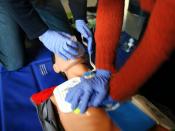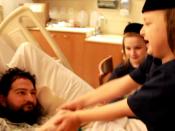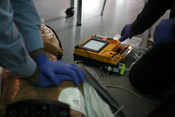Everyday there are accidents and the numbers of people who survive are little. Some of them die, and the others who have a chance to get to the hospital don't end well most of the times. A coma is an example of what can happen and it is a is a profound state of unconsciousness where the patient doesn't respond to stimulus or talking. A coma can be caused by "trauma, bleeding, swelling affecting the brain. Inadequate oxygen or blood sugar and various poisons can also directly injure the brain to cause coma." Coma may come with many dilemmas such as the emotional dilemma, the economical, and in cases even the decision of disconnecting someone. Life always presents difficult situations and decisions in life and people have to face them, coma being one, and it has to be faced and if the time comes to let go.
After time in a coma people can change into a permanent vegetative state where they are connected to machines to live.
In this kinds of things the decision of the disconection is important because even tough the patient hasn't die because his heart is still beating, is in other matters death. Organ donation can be a alternative for this people to think of, because while the patient is "death" but still living just by machines there are many lifes that can be saved with his organs.
Coma may also bring along a lot of emotions and after time it becomes an emotional burden. People eventually unconsciously become tired emotionally of having someone in a coma and this is because problems like this start to weaken the ones around little by little. Families are never ready to let go someone they love but it hurts most to loose someone they have close like having them in a coma, is like having them but not at the same time and when someone dies the family suffers but eventually they pass through a time of duel where they grief the one that is gone. When a coma happens people don't go to that grief because the one in a coma isn`t dead but neither is he alive therefore emotions start getting the best of them. An example is the one of Terri Schiavo. "She was an unfortunate young woman who suffered a cardiac arrest many years ago with subsequent brain damage from lack of oxygen. She had been in a persistent vegetative state since then, and was maintained on tube feedings. We heard about the disagreements between her family and her husband as to what Terri would want in this situation. Unfortunately, her whole family has been torn apart by the conflict surrounding her husband's decision, backed by the courts, to discontinue her tube feedings." This situation shows how a family can be torn apart in situation like this and how emotions are affected.
There are many times when people choose to sign a DNR order where coma or a vegetative state may be a possible result. A DNR is an order sign by the patient that means "Do Not Resuscitate" where the patient asks not to be resuscitated if the circunstances are presented, in general it asks not to use any kind of resuscitation teqhniques , drugs and machines. It is a legal document that says that a patient should not be resuscited if they suffer from cardial or respiratory arrest. This is the patient's way of saying they would rather die than have a life connected to machines or in a vegetative state. These orders can be signed by the patients themselves with an advance directive or by a relative choose by them to make decisions when they can`t.Advance directive is a decision you would like to have if you are unable to make medical decisions, and is something you request before. This happens when a patient suffers from cardiac arrest or life threatening arrhythmia. Also the orders can be signed by a relative that the patient gives permission to make all the decisions in regard to the patient. Even though in this orders the patient asks not to be resuscitated, the doctors will not give up once things become difficult so the are some policies and rules on what will be done and what will not be done in a case like that. "The things that will be done are: suction the airway, administer oxygen, position for comfort, immobilize, control bleeding, provide pain medication, provide emotional support, and contact health care. The things that will not be done are: administration of chest compressions, insert artificial airway, resuscitative drugs, respiratory assistance, resuscitative IV or cardiac monitoring". CPRis not given in two types of circumstances: When it is futile that means that gives no medical benefit and when the patient asks not to have it. There are many reasons why a patient decides to sign a DNR, most people sign them because of the odds that they have of recovery are minimal and also because the chances of a good quality of life are none. Most of the times they choose this because they donôt want to end in a vegetative-state or with a life only supported by air machines. All of this is because mostly a CPR cannot guarantee success and this success doesn't depends in the age but in the illness and patient's condition. For example "CPR has been shown to be have a 0% probability of success in the following clinical circumstances: Septic shock, Acute stroke, Metastatic cancer, Severe pneumonia. In other clinical situations, survival from CPR is extremely limited: Hypotension (2% survival), Renal failure (3%), AIDS (2%), Homebound lifestyle (4%), Age greater than 70 (4% survival to discharge from hospital)."Also it is futile in the vegetative state because it will not make the condition better, only worse than it is. Sometimes a family doesn't agree with the decision of a DNR and these occur a lot because they don't understand the motives that lead someone to sign a DNR order. In this kind of moments the family needs to see things from another point of view or from the patient's point of view, realizing that there could be many things that make him or her take this decision like not having a good quality life, and that in the end they have to respect the decision that has been made. The DNR orders are handed generally when a patient is terminally ill with a disease like cancer and even if the CPR was successful it would leave brain damage or a worse medical condition. These orders have been accepted by doctors, clergy, and lawyers and are medically and ethically appropriate some times.
There is also the ethical dilemma that surrounds the DNR order and the comma disconnection. In order to practice medicine and become a doctor a person has to take an oath called the Hippocrates oath. This oath says that doctors compromise to do everything in their power to save a person's life. This is a little contradictory because while the oath they took tells them to try everything to save a life , the DNR order is the request of a patient asking not to do it. This leads to an ethical dilemma because there is other thing called patient-doctor confidence where the patient puts the trust in the doctor and ethically it should be follow because of the patient's trust that has been relied in the doctor. Not following the request will be like betraying their trust.
There are different religious views in this topic, concerning coma, vegetative stete, organ donation and brain death. Following the DNR order may be consider in a certain level as Euthanasia or assisted dead because there was something that could have been done to save a the life. Euthanasia is seen badly by the eyes of church because it is attempting against other or their own life. The Catholic church has a base in the 10 commandments and one of them is "you shall not kill" and it applies to this situation because even tough it is not something with bad ends, the doctor is conscious of what he is doing as well as the patient because they gave their consent to perform something like that or order not to attempt a CPR and it is killing because according to church one is not the owner of his or her own life and there fore they have no right to decide whether to kill themselves or not and they say only God can do that. As time has passed the religious views in regard of this topic have changed and have adapt to how the cultures and costumes have change. It has slowly started opening their mind to these kinds of subjects and taking into consideration what advantages will be get with this. All of this because when someone decides to sign a DNR or perform Euthanasia, this can give the opportunity to have organ donors and how can they oppose to this when is life." Most religions like the Roman Catholic Church are in favor of organ donation as acts of charity and as a means of saving a life. Some impose certain restrictions. [1] For example, Jehovah's Witnesses require that organs be drained of any blood due to their interpretation of the disallowance of blood transfusion from the bible, and Muslims require that the donor have provided written consent in advance. Orthodox Judaism considers it obligatory if it will save a life, as long as the donor is considered dead as defined by Jewish law,[2] which is a matter of debate among different rabbis. A few groups disfavor organ transplantation or donation"Also there are stories in real life of people who pass through a coma or had a family member or a friend in a coma too. Many happy stories are told where a person wakes up from a coma and these are seen as miracles because the medical possibilities of waking up as time passes are less than 1%. They are stories of love, hope, persistence from everyone around the one in a coma. An example is the story of a polish railway worker who fell into a coma in 1988. His name is Jan Grzebski and he is 65 years old and he was cared by his wife Gertruda during his coma. He was in that state for 19 years before finally waking up and the love that his wife had for him was so great that she never stop taking care of him which meant turning him several times a day to avoid bed sores, to feed and change him; reading to him; talking to him but most importantly she never stop believing in him and she never loose the hope even after so much time. Other example of this is the story of a woman that after two weeks of being in coma she woke up before she was disconnected. Mr. and Mrs. Smith were in the hospital and she gave birth to her fourth child, an hour later there were some complications and after having 49 minutes of CPR she fell into a coma. Doctors said there was nothing more to do and after two weeks, the Smith family decided it was time to pull her off life support. Her husband took their kids to say their goodbyes and her 8 year old daughter wasn't ready to let her go so she said "Mommy if you love us and hear us open your eyes" and Lori moved her eyes. This story shows that when the family was about to loose all the hope they had and get resigned to the idea, the daughter still kept the hope. Another example of a person miraculously waking up from a coma is the one from a Chinese woman that woke up after 10 years in a coma. He always took care of her and he always tried to make her respond to stimulus but nothing worked, until one day he had the idea of biting her foot because that's were most nerves are and it worked out. Even though these stories had happy endings, really the waiting for someone to wake up is relative and all the stories of people who have waken up are not things that happen everyday, the possibilities of it are 1 in a million and even tough there always needs to be hope, there's not much that can be expected in situations like this and even less as time goes by.
This is a very controversial topic so it is used a lot on TV and in movies because of all the drama that surrounds someone in a coma and all the attention that it gets. It involves the feelings of the people around the one in a coma such as family, friends, or lovers like guilt, regret, longing, etc. Suffering and dramas always tend to attract the audiences attention and this is because even though they suffer along with the characters they like it. It is a good way of getting high ratings and therefore more money because it is what people like. The goal of this movies and TV series and shows is to create angst in the plot of the story and therefore generating it in the audience, most of the times using it as a cliffhanger and also to generate sympathy in people towards the characters and creating a need to watch the show. Many situations like this are used a lot in hospital TV series where you can see from the doctor's point of view like kind of seeing it from the outside what happens to a family and it is shown how they have to take decisions in regard to the patients; some of these series are: Grey's anatomy, House, ER, etc. Even tough these kind of episodes are well rated, they are 'nothing major and they're completely different from the ones that involve the main characters and their feelings. They attract attention because when it involves the main characters it is more personal and the people can feel it more because they have known the characters for a while. An example of this is the last season of Grey's anatomy where Izzie one of the doctors of the Seattle Grace Hospital finds out she has a brain tumor. Discovering this makes her see things from other perspective not as doctor, putting her in the other side of the mirror. She faces and struggles with a dilemma with her disease and decides to sign a DNR order because in her state she will probably end up in a vegetative state. This decision affects Alex Karev her husband and one of the doctors but also the other doctors too Meredith, Bailey, O' Malie, Shepherd, Yang because she is their friend and they love her. You can see how things change and how they act differently than if it was a patient and not someone they are close to, seeing how when emotions are involved it can cloud a little their thoughts and their ideas. In the end of the season Izzie has a complication and they face a dilemma whether to respect the DNR or not, in the end the chief decides to ignore it because even his feelings were involved and the CPR is attempted. Another example, a little different is when Mike of Desperate Housewives falls in a coma after being run over by a car. Suzanne his wife is constantly there for months and months but when she finally decides to give love a new chance is when Mike wakes up and she is not there to receive him.
In things like soap operas these kind of situations are predictable and too clichéd but it doesnôt matter because even if people already expect something like that to happen it always get attention. These is mostly used as a marketing technique to increase the rating of a show, or something used to take the monotony out of it giving a complete 180ú degree to it. It is always the same, is just as you will expect for the husband to cheat her wife with the maid it is just as expected to have someone in an accident and then in a coma and for the drama effect memory loss after they wake up. Some character will try to take the blame and other like a daughter, lover, son, etc will feel regret for not saying something before or for not apologizing. Soap operas have become so cheap that they use the same material over and over again but if it makes them gain money they donôt care.
How can someone doesn't want to be saved? Is what most people tend to think when facing this kind of situations but what they need to do is see things from other perspective and wonder if they will like to live a life connected to machines or in a vegetative state. Therefore it is selfish of someone to ignore the wishes of a person just because they are not ready to let go and after all they have to respect the decision that was made.
http://www.mamashealth.com/coma.asphttp://depts.washington.edu/bioethx/topics/dnr.htmlhttp://www.nhs.uk/Conditions/Vegetative-state/Pages/Introduction.aspx





